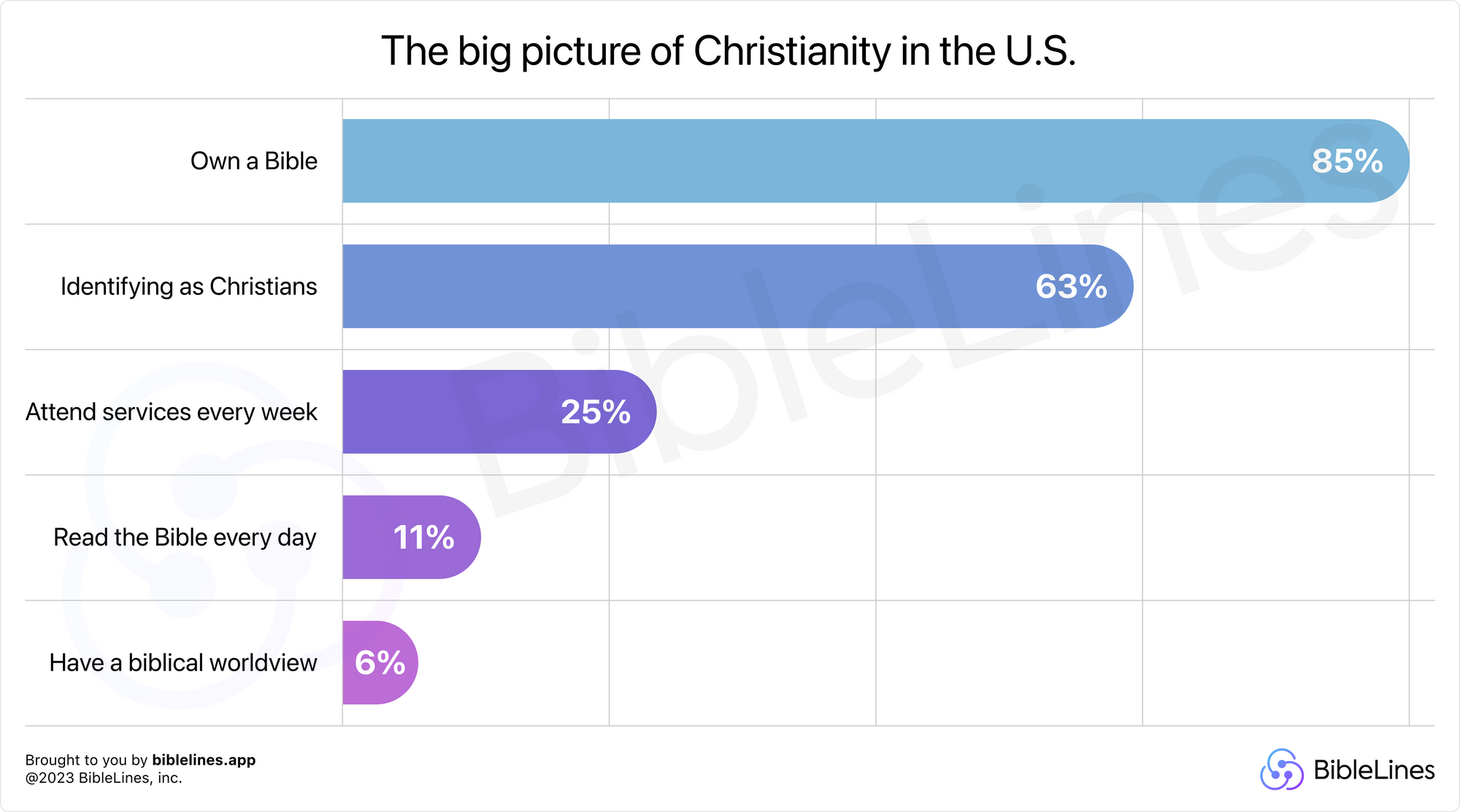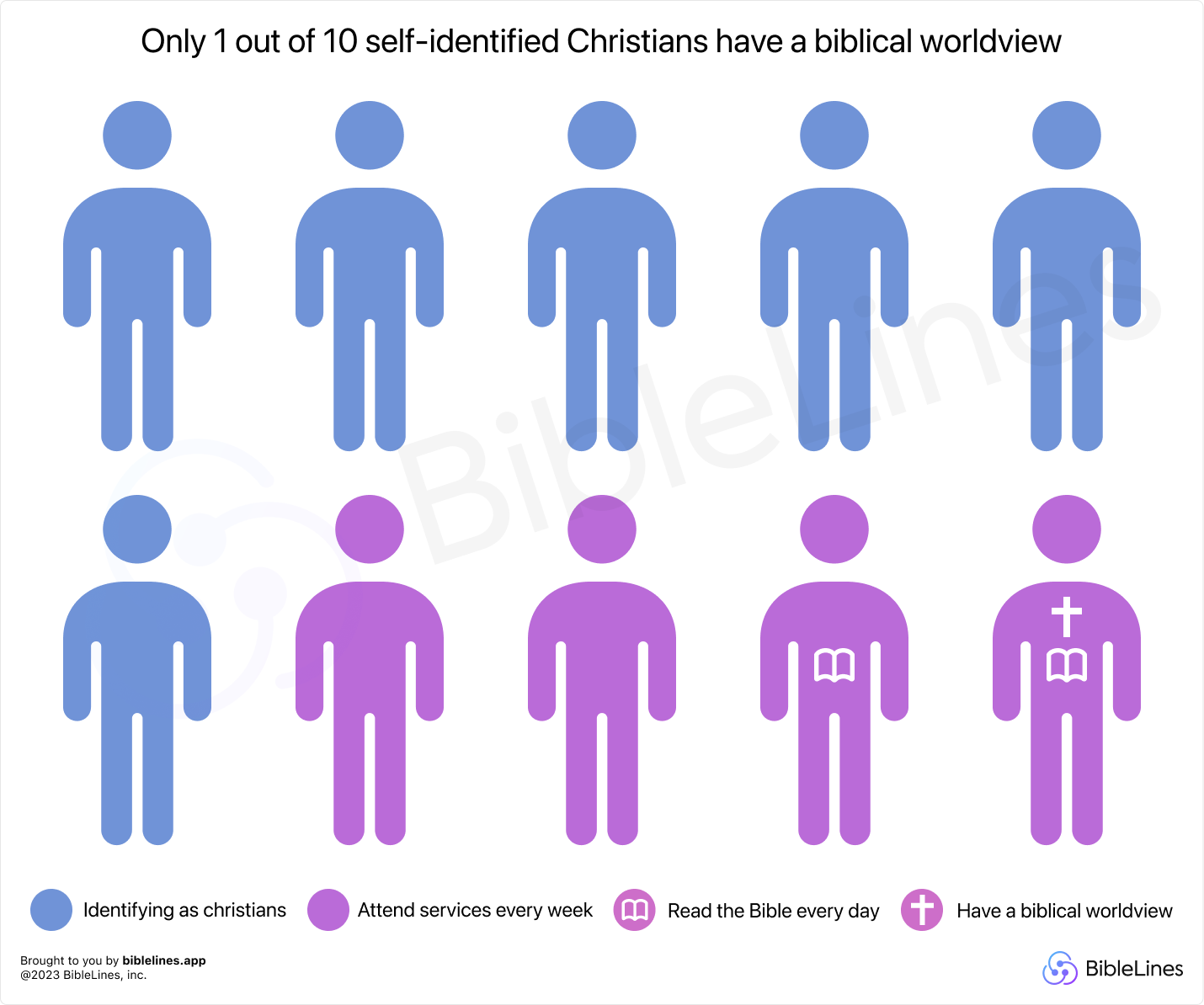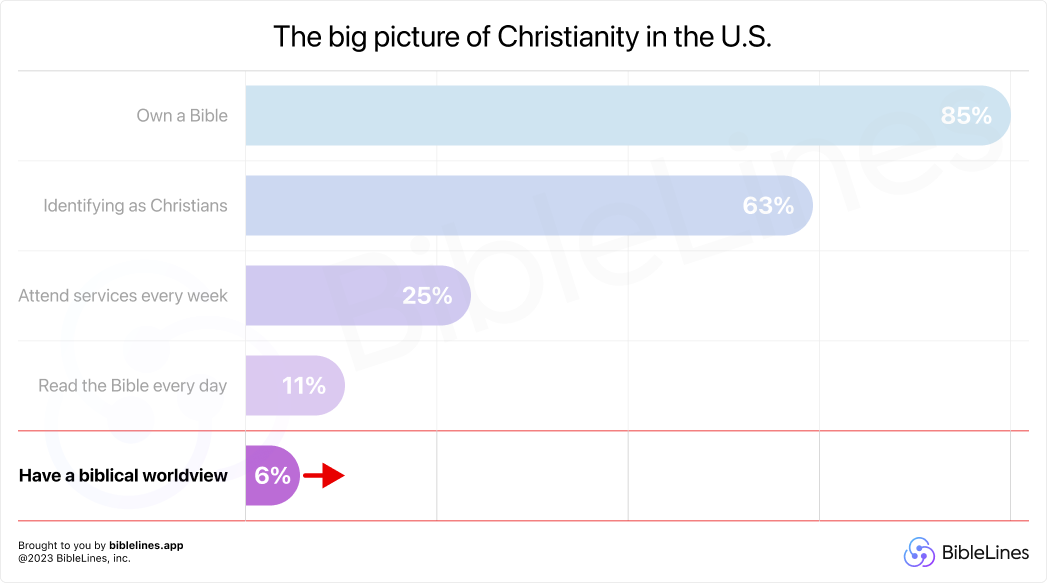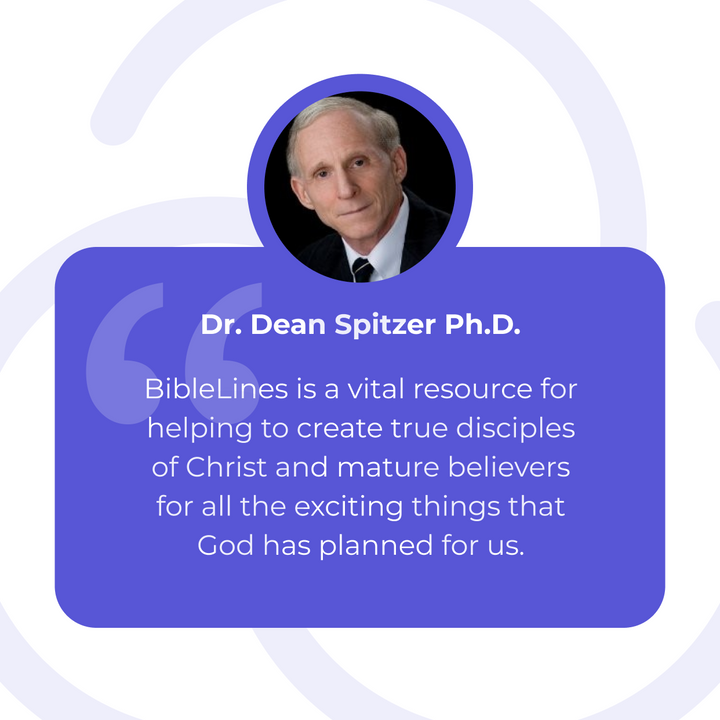Let's agree that regardless of denomination, our lives entirely depend on how well we know, understand, and put into practice the word of God. BibleLines is all about understanding God's Written Word: the Holy Bible.
There are approximately 2.6 billion Christians on the globe spread out over 45,000 different denominations. All these denominations have different doctrines and liturgy but have one common denominator - the Bible.
“Not everyone who says to me, ‘Lord, Lord,’ will enter the kingdom of heaven, but only the one who does the will of my Father who is in heaven." ... “Therefore everyone who hears these words of mine and puts them into practice is like a wise man who built his house on the rock." (Matthew 7:21,24 NIV).
According to the scripture, no one will enter the kingdom of heaven just by calling themselves Christians. Being blessed and having access to the kingdom is only by doing God’s will and putting God's words into practice.
"Blessed rather are those who hear the word of God and obey it." (Luke 11:28, NIV).
Additionally, obeying God’s word is a sign of love.
"If you love me, keep my commands" (John 14:15, NIV).
The truth is that doing God's will and keeping His commandments starts with studying and understanding His Word: the Holy Bible.
The Big Picture
The Bible is widely owned, but not well known.
The chart below is a combination of a few studies conducted in the U.S. between 2021 - 2023.

These stats are from the United States but I don't think the picture is much different across the Christian world.
According to studies, 63% of people identify as Christian, but only 6% have a biblical worldview. This essentially means that:
What is the "Biblical worldview"?
George Barna, Director of Research, Cultural Research Center at Arizona Christian University, says:
“Two out of three Americans think of themselves as Christians, and a majority still think that Christianity is kind of about the Bible. But there’s a big gap between what (self-identified Christians) believe the Bible may teach, and what the Bible actually teaches.” - Gorge Barna
For example, more than half of the people who identify as Christians (58%) believe that a person who is good enough, or one who does enough good works will make it to heaven. Numerous examples and explanations are provided in the report regarding how self-identified Christians reject and misunderstand biblical principles and teachings. And only 6% are in harmony with biblical principles or have a “Biblical worldview.”
There seems to be a huge gap between what the Bible teaches and what most Christians actually believe. It’s disheartening that so many Christians own a Bible and consistently hear God’s word but so few understand even the basic principles of God’s will. Which of those actually apply it to their daily lives?
Therefore do not be foolish, but understand what the Lord’s will is. (Ephesians 5:17, NIV)
There is one very important but mostly ignored stage between knowing the Word and doing God’s will. It's all about understanding. See, for you to obey the word, you need to know and understand it.
Give me understanding, so that I may keep your law and obey it with all my heart. (Psalms 119:34, NIV)
Let's remember the Pharisees. They would often bring questions to Jesus about the law and based on Jesus’s responses, the Pharisees were clearly misquoting or misinterpreting the scriptures. The sad part is they not only misunderstood the word but they also taught the wrong doctrine to God’s people.
The Big Problem
The Word is Widely Heard but Not Well Understood.
63% of Americans identify as Christian, 25% attend church services at least once a week, but only 11% read the Bible every day. Furthermore, only 6% have a "biblical worldview".
So, here is the big problem:

I believe it should be changed.
As every Christian should, I have searched for my calling for many years. I was sure that it must contribute to His Great Commission of Matthew 28 and Mark 16 — to disciple people and nations. However, I was unable to connect the dots between God's plans and my plans. Until one day, when I met Gerald Duran. His book "HisPlan MyPlan" & his teachings have completely changed my mindset, and helped me to develop my faith, find my calling, and connect the dots…
The strategy for starting the change is underlaid in the first chapter of the book of Acts.
But you will receive power when the Holy Spirit comes on you; and you will be my witnesses in Jerusalem, and in all Judea and Samaria, and to the ends of the earth.” (Acts 1:8, NIV)
So, to reach the ends of the earth, we need to start from those who are already in the church & already reading the Bible... in other words:
- I believe these statistics should be changed from the bottom up: by increasing the percentage of Christians who demonstrate the "biblical worldview".
- I believe it will cause the rise of other metrics progressively and It will have a huge impact on the whole picture.
- I believe that there is a big opportunity to help people reading the Bible to understand its foundations through today's innovative technologies.

Below are two examples from the Bible that complement each other showing how the strategy works.
1. The parable of the sower.
Jesus explaining the parable to the disciples says:
"When anyone hears the message about the kingdom and does not understand it, the evil one comes and snatches away what was sown in their heart. This is the seed sown along the path.” (Mathew 13:19, NIV)
“But the seed falling on good soil refers to someone who hears the word and understands it. This is the one who produces a crop, yielding a hundred, sixty, or thirty times what was sown. (Mathew 13:23, NIV)
The key difference between these two segments of people is understanding. Just as is illustrated in the parable, there is always a group that understands and another that doesn't. And those who understand produce a crop, yielding thirty, sixty, or a hundredfold return.
2. Philip and the Ethiopian eunuch.
In the story about Philip and the Ethiopian eunuch (Acts 8:26-39, NIV) there are some interesting points:
- The Ethiopian had gone to Jerusalem to worship and was now traveling back home.
- While in transit, he was reading the book of Isaiah but he just couldn’t figure out what the prophet was saying.
- An angel of the Lord sent Philip by the Holy Spirit to the Ethiopian to ask if he understood whatever he was reading.
- To this, the Ethiopian had a straightforward answer, “How can I (understand), unless someone explains it to me?"
Once Philip had explained how the prophet was talking about the Messiah and told him the good news about Jesus, the Ethiopian got convicted and decided to get baptized.
By combining these two examples, we can say that to increase the number of people who produce a crop we need more of God's servants like Philip to help people to understand the written word.
But the workers are few.
Once Jesus saw the crowds like sheep without a shepherd and said to his disciples:
The harvest is plentiful but the workers are few. Ask the Lord of the harvest, therefore, to send out workers into his harvest field (Matthew 9:37-38, NIV)
Over the past 2,000 years, the Lord has sent out a lot of workers into his harvest field. Today, hundreds of thousands of God's servants are doing great work in God’s harvest field by teaching and explaining the scriptures.
However, the numbers are showing that our current state is not good enough. We are only 2.3 billion Christians which is less than 30% of the globe. Clearly, the harvest field is still in need of laborers. One may even say that just like in the days of Jesus, the workers are still few. There is still a lot of work to be done and we should take advantage of today's technology to scale the effort of the workers.
The mission of BibleLines
If you think about it, you will easily think of a couple of examples of how the Church is already leveraging technology to reach more people. Starting from the basic public address systems to more sophisticated tools like YouTube and other Live streaming apps, technology can greatly help in fulfilling the great commission.
However, even though the church has embraced technology over the years, we are still not doing very well in the harvest field. The current state is the result of the current methods. We need something else - something disruptive, that can make a difference and significantly increase the number of people understanding the word.
And that's where the BibleLines comes and that's what the mission of BibleLines is:
The Big Idea
Thousands of Revelations between the lines of the Bible.
To describe what BibleLines is and how it will achieve the above-mentioned mission I need to share some Verses from the letters of the apostle Paul.
So Christ himself gave the apostles, the prophets, the evangelists, the pastors and teachers, to equip his people for works of service, so that the body of Christ may be built up until we all reach unity in the faith and in the knowledge of the Son of God and become mature, attaining to the whole measure of the fullness of Christ. (Ephesians 4:11-13 NIV)
Let's use one phrase to refer to the apostles, prophets, evangelists, pastors, and teachers - God's servants.
What then shall we say, brothers and sisters? When you come together, each of you has a hymn, or a word of instruction, a revelation, a tongue or an interpretation. Everything must be done so that the church may be built up. (1 Corinthians 14:26, NIV)
Let's use one phrase for hymns, words of instruction, revelation, tongues, and interpretation of tongues - Bible-based content.
What the BibleLines is?
Now using these conditional phrases we can describe the BibleLines by the following sentence:
Imagine the last Sunday a pastor preached about the "Good Samaritan", and the video of the preaching is on YouTube. BibleLines gives the ability to add the video under every verse used in the sermon (e.g. Luke 10:25-37, Deut. 6:5, Lev. 19:18) So, readers can click on each mentioned verse and listen to the preaching from the exact second where the verse has been mentioned. Engage with the content (like, save, comment) and share with their church members inside the BibleLines platform and with anyone outside BibleLines on other social networks like Facebook, Twitter, Instagram, LinkedIn, etc. inviting them to BibleLines.
How it will help people?
Try to ask Christians if they remember what was preached three months ago. What about six months ago? Or one year ago? In most cases, only a few will remember a couple of key points. The few who remember the sermon are usually those who take notes and study the text back at home. But if we are being honest, that’s a very small percentage of churchgoers.
Sadly, most of the powerful revelations received from the Holy Spirit and preached by God's servants are quickly forgotten. Over time, a preacher may be the only person who remembers them.
Get wisdom, get understanding; do not forget my words or turn away from them. (Proverbs 4:5 NIV)
BibleLines combines all Bible-based content under every mentioned verse and keeps them forever by building a content feed organized like news feeds of social networks. This means that every Bible reader will be able to meet the content produced under each verse by all God's servants who ever mentioned that verse. This will allow the reader to read/listen/watch the content explaining every verse which will ultimately help them understand the scripture they were reading. The reader will also be able to choose whom to follow and which publisher’s / author’s content to see more, engage, and share spreading the Gospel.
Today, angels may not send Philips to explain the scripture to Ethiopians. However, preachers can use BibleLines to make their content available to all readers of the Bible. Imagine thousands of people like the Ethiopian will be able to click on verses like Isaiah 53:7-8 and listen to the interpretation of the prophecy by their pastors. Just think of all Bible-based content as a commentary that Bible readers have.
The Vision of BibleLines
According to God’s will, every pastor dreams of seeing the growth of the church, both: quantitatively and qualitatively. In other words, each pastor desires to see the continuous transformation of the lives of every churchgoer.
So at first, BibleLines will become a platform fully integrated with churches' lives and services providing the best experience for church leaders and members to maximize the understanding of God's Word in the church. After which it will be ready to become something bigger...
As I mentioned, over the past 2,000 years, the Lord sent out a lot of workers into his harvest field. And God's servants have done some priceless work, served the people of their time by explaining and educating them about the Scriptures. Some of their works have been written in books and saved till our days, and some have been forgotten. I believe there were so many treasures & revelations that could have an impact on our lives and bring us closer to God, today also...
Over time, when the majority of Christian communities (churches, ministries, organizations) will become members of BibleLines the system will be self-sufficient. We will start gathering and integrating all kinds of content (books, articles, audio & video) of all less-known & well-known God's servants from all times and all denominations accepting the Nicene Creed to build the most powerful Bible intelligence ever.
So, the BibleLines vision is:
In other words, we want to bring back all content that is based on the Bible and organize it between the lines of the Bible, to maximize its impact from local communities to the global church.
How to contribute to BibleLines?
BibleLines is in its early stages of development and there are a lot of areas where every contribution matters. So, if our vision & mission have spoken to your heart we will be happy to hear from you.
Instead of final words I want to say that regardless of how different we are, I believe that nothing transforms our lives, minds, and hearts like the Word of God. Time spent reading the Bible and praying has more impact on spiritual growth and maturity than any other spiritual discipline. But what will really transform us is when we read with understanding – and that is what BibleLines is all about.
God bless You.
- Perch
 Support
Support



